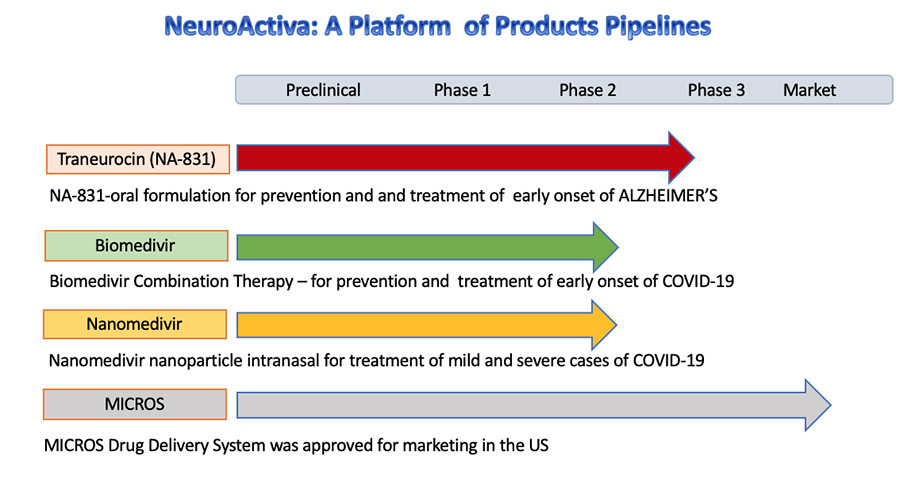RESEARCH STRATEGIES
Almost all Alzheimer drug candidates failed in Phase 3 over the past 20 years. These drugs were developed based on the guiding principle of the Amyloid hypothesis. The Amyloid Hypothesis proposed in 1984 postulates that accumulation of amyloid plaques triggers a cascade that harms neurons and synapses.
The common approach over the past 20 years has been to use immunotherapy or modulation of the γ-secretase , β-secretase cleavage enzyme BACE1 to remove amyloid plaques. We believe that the amyloid hypothesis is wrong and we need to find a new pathway.To be effective, an Alzheimer drug must have ability to cross the blood brain barrier (BBB). Almost all failed AD drugs have poor ability to cross the BBB. Example: Bapineuzumab, Solenezumab, have less than 2% of its molecules cross the BBB.
All the failed drugs have serious toxicity, because they require a very large dose to get some drug molecules passing the blood brain barrier.
Almost all these drugs cause ARIA-E (Amyloid-related brain imaging abnormalities with edema)- brain swelling and aseptic meningitis, a fatal condition.
The failure of all Aβ-targeted therapeutics in Phase III clinical trials suggests that it is timely and prudent to consider alternative drug discovery strategies for Alzheimer's disease.
NEUROACTIVA™’S SOLUTIONS:
NeuroActiva™ has developed a new platform of new drug candidates for treatment of Alzheimer’s and other neurological diseases.
Our guiding principle is based on proven clinical strategies of:
1st strategy: NEUROPROTECTION: to protect the damaged neurons by activating the neuronal defense system.
2nd strategy: NEUROGENESIS: to regenerate new neurons to activate the neurotransmission pathway
3rd strategy: ENHANCING COGNITIVE CAPACITY AND MEMORY
There is no-disease modifying drugs ever been approved for marketing in the United States and all major countries. Researchers continue to find new and better approaches for slowing the progression of Alzheimer’s disease. The combined strategies will restore the lost memory and to rebuild the cognitive ability and mental functions. This will help stop and cure Alzheimer’s disease
NEUROACTIVA’S PLATFORM OF PRODUCTS
NeuroActiva™ has developed a new platform of new drug candidates for treatment of Alzheimer’s and other neurological diseases with innovative mechanism of action. Our flagship drug is called Traneurocin™ or NA-831™. The second drug is called Vineurocin™ or NA-704™.
Clinical Trials of NA-831™
HOW DOES THE DRUG NA-831 ™WORK?
The drug NA-831™is a small molecule drug that can be administered orally. The drug is an endogenous compound i.e. it already exists in the human brain. Basically, the drug is very safe and has no toxicity, suitable for long term treatment and prevention purpose.
The drug NA-831 can easily crosses the blood brain barrier, so only a small dose of the drug is required to be effective. The drug shows the following properties:
PROOF OF SAFETY AND EFFICACY OF NA-831™ in PHASE 2 CLINICAL
NeuroActiva has conducted a Randomized Double-Blind Placebo-Controlled Phase 2A Clinical Trial of NA-831 in Patients with MCI and Mild and Moderate Alzheimer’s Disease on 32 patients with mild cognitive impairment and 24 patients with mild and moderate Alzheimer’s disease.
Based on the Brief Cognitive Rating Scale (BCRS,) the effects of NA-831 were apparent after 14 weeks of treatment (p=0.01), with the significant improvement after 24 weeks in the following areas:
In addition, patients had significant quality of life improvements, with less fatigue, anxiety, irritability, affective lability, disturbance to waking, daytime drowsiness, headache, and nocturnal sleep.
NA-831 was well-tolerated with no adverse events or concerning safety signals. In addition, there was a significant improvement in the memory test performance for the Alzheimer’s patients in the study who were administered NA-831 compared to placebo.
NA-831 showed a significant improvement for patients with mild and moderate AD with the ADAS-Cog score changed of an average of 4.1 as compared to the placebo after 24 weeks of treatment . The Clinician's Interview-Based Impression of Change Plus Caregiver Input (CIBIC-Plus) showed 82.1% patients improved.
The topline results of the Phase 2A of NA-831 was presented at the Alzheimer Association International Conference (AAIC) - July 25, 2018 in Chicago and the follow-up results were given at the AAIC, July 17, 2019 in Los Angeles.UPCOMING PHASE 3 CLINICAL TRIALS OF NA-841
Neuroactiva plans to conduct two Phase 3 programs for NA-831:
(1) The COGNITION Program for the treatment of 375 patients with mild and moderate Alzheimer’s disease over 12 months. Age group: 65- 80 years of age.
(2) The PREVENTION Program for the prevention of 550 subjects, asymptomatic from a high risk population over 24 months. Age group: 45-70 years of age.
These trials follow strict scientific standards and regulatory requirements to protect patients and help produce reliable results.
Study physicians will review risks and potential benefits with patients and their caregivers before patients are enrolled in the clinical trials.
The Phase 3 clinical trials of NA-831 have been designed to evaluate its safety and efficacy as required by the US Food and Drug Administration (FDA) and other regulators overseas before being approved for usage and marketing worldwide.
Vineurocin™ (NA-704™)
Our second drug candidate, Vineurocin (NA-704) that can regulate cell growth and development, especially in nerve cells, as well as cellular DNA synthesis.
NA-704 exhibits neuroprotection and neurogenesis, which has been demonstrated as a strong candidate for treatment of Alzheimer’s disease and other neurological disorders. NA-704 is administered intravenously once a week, per prescription of a qualified physician.
NA-704 is in Phase 1 clinical trial in 2019.
MICROS™Controlled Release Infusion System
Besides biopharmaceutical, NeuroActiva has developed an advanced intravenous drug delivery, known as the MICROS™ Infusion System, which can be prefilled with NA-704 to control release an accurate amount of the dosage to patient in hospital as well as in homecare setting. The MICROS infusion system has been approved by the FDA for marketing in the USA.
For more information about our platform of products, please go to PRODUCTS pages









